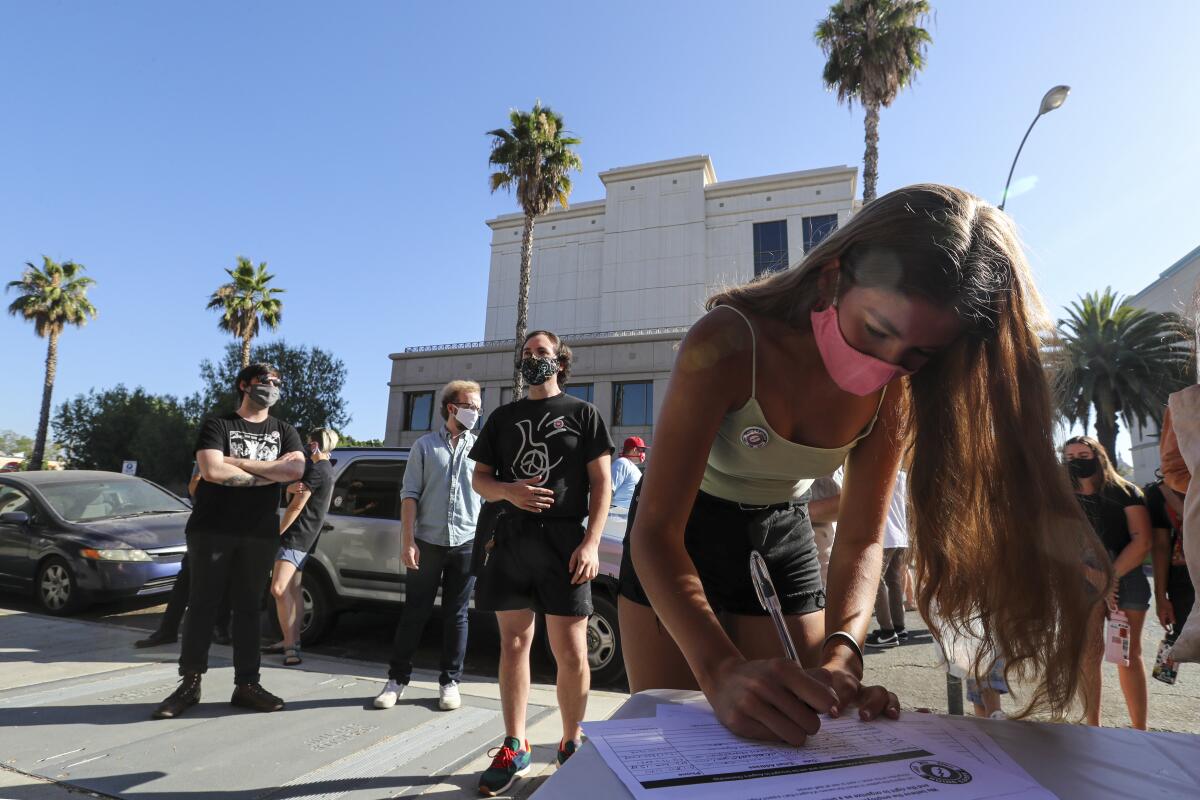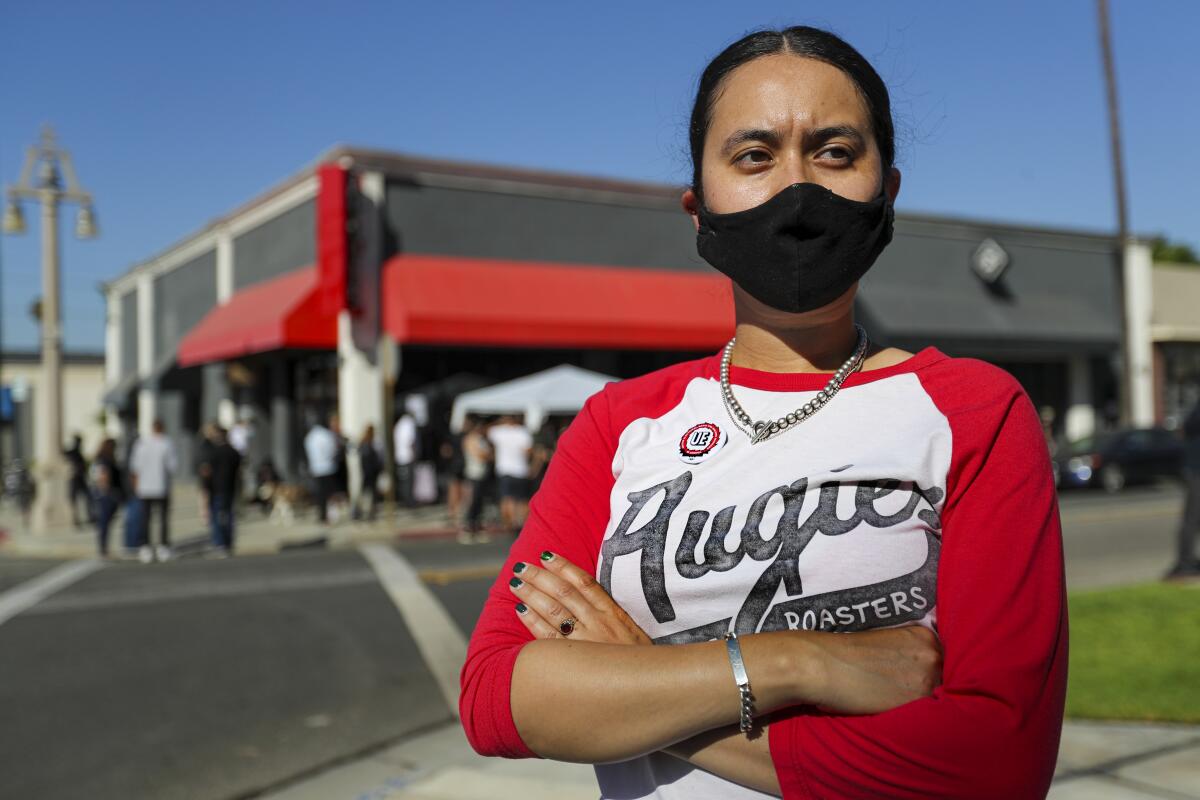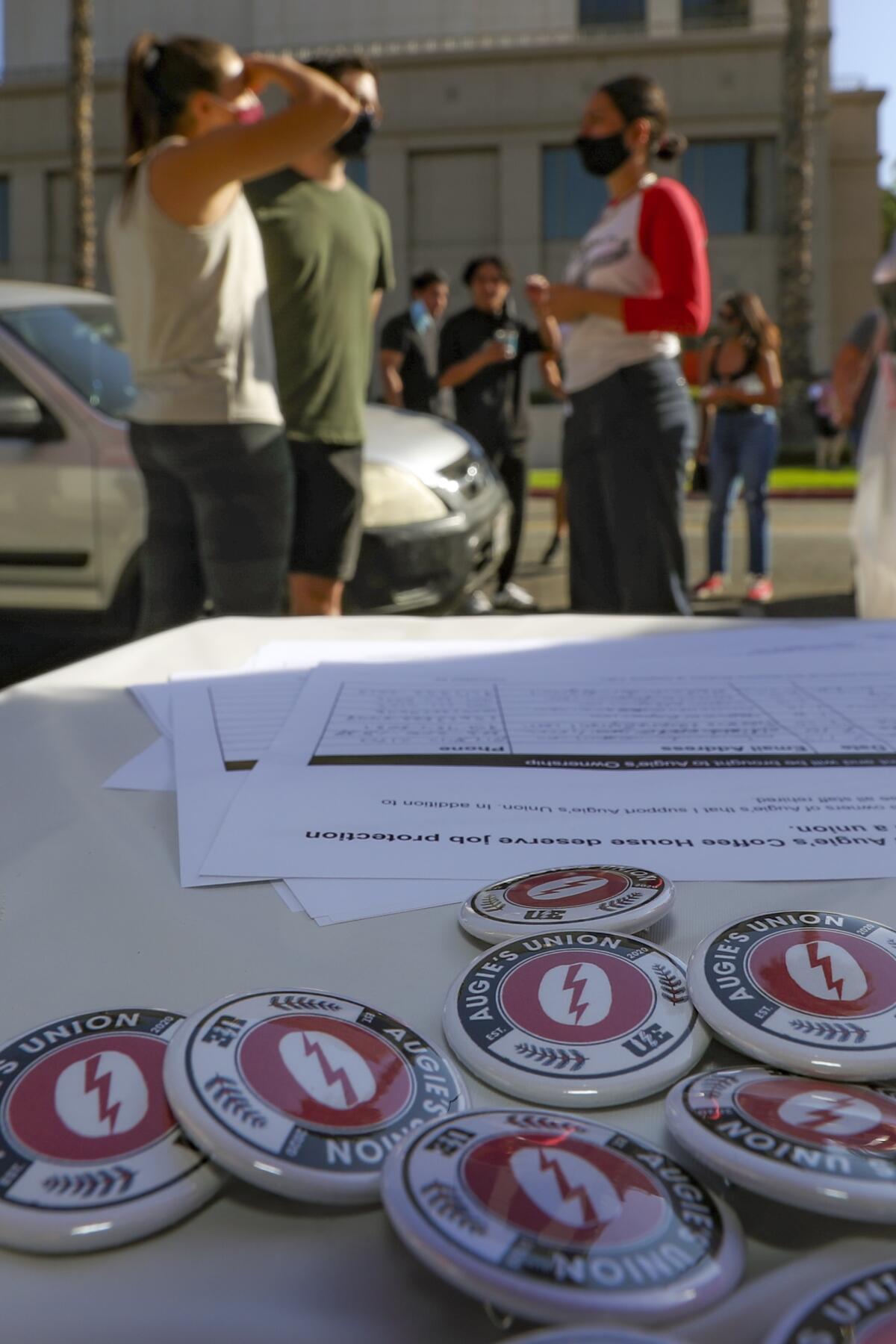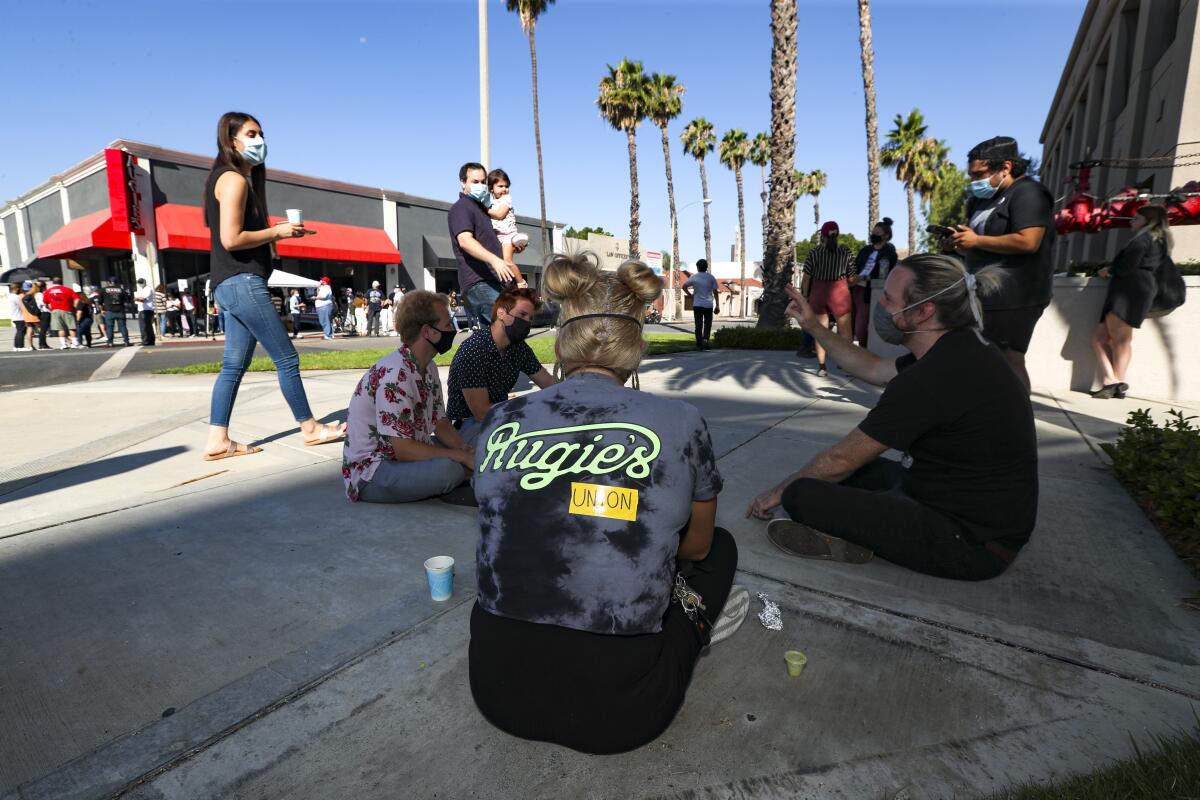Did baristas lose their jobs because of COVID-19 or because they tried to unionize?

- Share via
It was just like the heady pre-pandemic days at Augie’s Coffee on a recent Friday morning in downtown Riverside.
About 80 regulars lined up outside the beloved Inland Empire mini-chain, which had meticulously built its reputation as a neighborhood hub through delicious drinks and woke politics. College students and county workers, cyclists in their spandex finest and flâneurs waited patiently for cold-brewed coffee, vegan cupcakes and breakfast tacos while chatting up their favorite baristas.
All the hubbub happened outside, though. Augie’s was closed — perhaps permanently.
On July 4, the company announced the immediate shutdown of its five locations and laid off 54 employees, just a week after workers announced they planned to become one of the few unionized coffee shops in the U.S. Father-and-son owners Andy and Austin Amento blamed the demise of their business on the economic and health ravages of the coronavirus.
In an interview conducted via email, Austin Amento, 31, maintained that the shutdown happened after a rapid loss of profits and a rash of managers quitting made him and his father “worried that we were in line to become the next [coronavirus] hot spot.”
The regulars didn’t buy it.

Many of the chain’s workers had been customers first who were inspired to join the type of company that regularly helped nonprofits and applauded staff for organizing and participating in vigils for George Floyd. Now, customers were signing up for a different kind of activism.
They stood in the blistering sun to put their name on a petition demanding that the Amentos rehire their workers. Someone had covered up an Augie’s logo with a poster that said “Community, not coffee.” Nearly everyone wore red, white and black pins that read “Augie’s Union.”
“I see my baristas more than I do my own family,” said 20-year-old Marcial Zaroff-Hernandez of Yucaipa, who was there with his brother Ezra. Their go-to order: large coffee with oat milk. “I’m so proud of what they’re doing.”
“These people are the backbone of our community,” said Norman Ellstrand, a UC Riverside genetics professor who stopped by once a week before the university halted in-person classes in March. He was there with his wife, also a UC Riverside professor. “So of course we would come out to support.”
“It feels like my parents are getting a divorce,” said 35-year-old Redlands resident Freedom Rode. “I still don’t want to believe what happened.”
What’s going on with Augie’s is drawing attention from more than just caffeine fiends. The company’s struggle has attracted interest from baristas nationwide, as well as from local labor leaders who see the battle as a small-scale referendum on the Inland Empire’s economy.
“These young people are working people, too,” said Karen Macias, a vice president for the AFL-CIO’s Inland Empire Labor Council. She attended the Augie’s rally with a fellow board member and a platoon of tough-looking Teamsters who looked like their idea of fancy coffee was a Styrofoam cup paired with a bear claw.
“It’s important to show up and support people fighting for an Inland Empire that’s not all low-paying jobs,” Macias continued. “We’re not cheap labor and land anymore.”

Unionized coffee shops remain a rarity in an industry in which worker turnover is high and wages perpetually low. Two small New York-based chains have organized — Gimme! Coffee in 2018 and Spot Coffee earlier this year — and that’s about it.
“This sector is crying out for unionization,” said Mark Meinster, international representative for the United Electrical, Radio and Machine Workers, which helped Augie’s staff unionize — the first-ever coffee shop to join the UE in its 84-year history.
Meinster added that many workers at small businesses feel guilty even thinking about organizing, because “no one believes their employers are Amazon or Walmart.”
But coronavirus has sparked a large-scale rethinking.
“There’s an added urgency,” Meinster said, “given the immediate life-or-death safety issues many face.”
That’s what Augie’s workers say pushed them to organize.
Melodye Anderson, 31, had worked at Augie’s for six years. She handed out her vegan cupcakes underneath a tent while explaining the situation to the hungry.
“I felt we were working for a true ethical company,” said the Redlands resident. “We made our own syrups and cared about issues. But us losing our jobs showed the opposite. I’m heartbroken.”
The problems started in May, when Augie’s began to slowly regain business. Employees who had refused to show up to work in the spring due to coronavirus fears said they found themselves shut out of shifts.
Employees said they gave up hours so their colleagues could come back. Soon, everyone began to grumble about years of promised raises that hadn’t happened and fear of job security as California deals with economic calamity and mandated shutdowns.
“We had some vague talks about what we could do,” said catering manager Daniel Storll, 28. “Any talk of unionization was the most hypothetical that it could be.”

He and others reached out to the Democratic Socialists of America, which has a partnership with UE to organize workers. After a couple of video chats, Augie’s workers agreed that a union was the best way forward.
At a tense town hall June 26 at the Redlands warehouse, they asked the Amentos to accept the request.
“We thought that the most devastating reaction was that they wouldn’t recognize the union, and then we’d have to go to a vote,” said Anderson. “Not lose our jobs.”
“There was no hint we’d get shut down,” said 30-year-old Riverside resident Josh Penunuri. Augie’s had just bought expensive slushie machines for all of its locations and launched a social media campaign to promote the new item for summer.
The layoffs gripped the Inland Empire’s activist scene; more than 150 people showed up to jeer the Amentos July 5 at company headquarters while Augie’s workers grabbed their severance checks. A GoFundMe campaign raised more than $21,000 for workers, and the UE filed a complaint with the National Labor Relations Board alleging that Augie’s laid off its workers as retaliation.
Austin Amento denied the charge and added that his former staff “has clarified that they have good intentions with their desire for a union, and we believe them.” Asked whether Augie’s would ever reopen, Amento said some locations may “potentially” return, depending on how the pandemic plays out. Rehiring would be on a “case-by-case basis, regardless of past interest in unionization,” he said.
In the meantime, Augie’s offers local delivery for extra-large latte orders. That led to Augie’s Union calling for a boycott, while its members told their individual stories on Instagram.
“It’s been a trip to see the beginning and the end,” said barista Brianda Medina, 28. She helped to open the Riverside location and mingled with loyal customers during the Friday gathering. “It’s just been a lot of years of miscommunications [with management]. We didn’t feel like we were appreciated. We want to be important to them.”
Medina looked around and began to tear up. “It’s good to see,” she said, “that our customers care, at least.”
More to Read
Sign up for Essential California
The most important California stories and recommendations in your inbox every morning.
You may occasionally receive promotional content from the Los Angeles Times.











